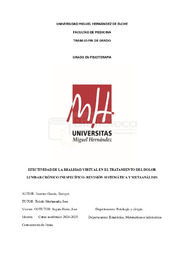Por favor, use este identificador para citar o enlazar este ítem:
https://hdl.handle.net/11000/37525Registro completo de metadatos
| Campo DC | Valor | Lengua/Idioma |
|---|---|---|
| dc.contributor.advisor | Toledo Marhuenda, José Vicente | - |
| dc.contributor.advisor | Segura Heras, José Vicente | - |
| dc.contributor.author | Jiménez García, Enrique | - |
| dc.contributor.other | Departamentos de la UMH::Patología y Cirugía | es_ES |
| dc.contributor.other | Departamentos de la UMH::Estadística, Matemáticas e Informática | es_ES |
| dc.date.accessioned | 2025-09-24T09:39:17Z | - |
| dc.date.available | 2025-09-24T09:39:17Z | - |
| dc.date.created | 2025-05-28 | - |
| dc.identifier.uri | https://hdl.handle.net/11000/37525 | - |
| dc.description.abstract | Objetivo: Analizar la efectividad de la realidad virtual (VR) frente a tratamientos convencionales o la no intervención en el abordaje del dolor lumbar crónico inespecífico, evaluando su impacto sobre el dolor, la kinesiofobia y la discapacidad funcional. Métodos: Se realizó una búsqueda electrónica en PubMed y EMBASE hasta febrero de 2025. La estrategia se diseñó según el formato PICOS. Se incluyeron ensayos clínicos aleatorizados (ECAs) en adultos con dolor lumbar crónico ≥ 12 semanas, que compararan VR inmersiva o no inmersiva con otras terapias o sin intervención. Se excluyeron estudios no ECAs, sin uso de VR o que no midieran dolor, kinesiofobia o discapacidad. El riesgo de sesgo se evaluó con RoB 2.0 y la calidad metodológica mediante la escala PEDro. Resultados: Se incluyeron 15 estudios (n = 901). La VR mostró tamaños del efecto estadísticamente significativos en la reducción del dolor, la kinesiofobia y la discapacidad. Se obtuvieron resultados más prometedores entre la primera y la cuarta semana. Los mejores resultados se observaron con frecuencias mayores o iguales a 2 sesiones/semana y sesiones de al menos 20 minutos. Existe gran heterogeneidad en protocolos y dispositivos. Se excluyeron cinco estudios como outliers, aunque su análisis cualitativo respaldó la eficacia de la VR. La VR mostró diferencias estadísticamente significativas a las 1-4 semanas y a las 6 semanas (SMD: 2.51; IC95%:[1.08 ; 3.93]) y (SMD: 1.37; IC95%:[1.05; 1.68]) respectivamente. | es_ES |
| dc.description.abstract | Objective: To analyze the effectiveness of virtual reality (VR) compared to conventional treatments or no intervention in the management of chronic nonspecific low back pain, evaluating its impact on pain, kinesiophobia, and functional disability. Methods: An electronic search was conducted in PubMed and EMBASE up to February 2025. The search strategy was designed according to the PICOS format. Randomized controlled trials (RCTs) in adults with chronic low back pain lasting ≥12 weeks were included, comparing immersive or non-immersive VR with other therapies or no intervention. Studies that were not RCTs, did not use VR, or did not assess pain, kinesiophobia, or disability were excluded. Risk of bias was assessed using RoB 2.0, and methodological quality was evaluated using the PEDro scale. Results: Fifteen studies were included (n = 901). VR showed statistically significant effect sizes in reducing pain, kinesiophobia, and disability. The most promising results were observed between the first and fourth week. The best outcomes were achieved with frequencies of at least 2 sessions per week and sessions lasting at least 20 minutes. There is considerable heterogeneity in protocols and devices. Five studies were excluded as outliers, although their qualitative analysis supported the effectiveness of VR. VR showed statistically significant differences at 1–4 weeks and at 6 weeks (SMD: 2.51; 95% CI: [1.08; 3.93]) and (SMD: 1.37; 95% CI: [1.05; 1.68]), respectively. | es_ES |
| dc.format | application/pdf | es_ES |
| dc.format.extent | 69 | es_ES |
| dc.language.iso | spa | es_ES |
| dc.publisher | Universidad Miguel Hernández | es_ES |
| dc.rights | info:eu-repo/semantics/openAccess | es_ES |
| dc.rights | Attribution-NonCommercial-NoDerivatives 4.0 Internacional | * |
| dc.rights.uri | http://creativecommons.org/licenses/by-nc-nd/4.0/ | * |
| dc.subject | Realidad virtual | es_ES |
| dc.subject | dolor lumbar crónico | es_ES |
| dc.subject | kinesiofobia | es_ES |
| dc.subject | discapacidad | es_ES |
| dc.subject | revisión sistemática | es_ES |
| dc.subject.other | CDU::6 - Ciencias aplicadas | es_ES |
| dc.title | Efectividad de la realidad virtual en el tratamiento del dolor lumbar crónico inespecífico: Revisión sistemática y metaanálisis. | es_ES |
| dc.type | info:eu-repo/semantics/bachelorThesis | es_ES |

Ver/Abrir:
TFG .pdf
3,09 MB
Adobe PDF
Compartir:
 La licencia se describe como: Atribución-NonComercial-NoDerivada 4.0 Internacional.
La licencia se describe como: Atribución-NonComercial-NoDerivada 4.0 Internacional.
.png)